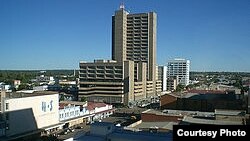WASHINGTON DC —
The conservative Washington-based think-tank, Heritage Foundations’, 20th Annual Index of Economic Freedom Report measuring the rule of law, government spending and fiscal dependency, regulatory efficiencies and openness of the market, has defined Zimbabwe as repressed for the 18th consecutive year owing to economic instability and policy volatility.
"Free" economies, according to the Foundation, should score better than 80 points out of 100 in their survey and the so-called "repressed" states less than 49.9 points.
Zimbabwe scored only 35.5 points largely due to corruption, an inefficient judicial system and general lack of transparency.
Botswana scored 72 points making it Africa’s success story. Burma is the world’s most improved state. Finance Minister Patrick Chinamasa was not immediately available for comment but Harare has dismissed such reports as biased.
International Crisis Group senior researcher Trevor Maisiri says Zimbabwe needs to improve its international perception.
At the same time, in a move likely to boost Zimbabwe’s economic fortunes, the Chamber of Mines of Zimbabwe says it is seeking readmission to the London Bullion Market Association (LBMA).
The LBMA is a wholesale over-the-counter market for the trading of gold and silver. Trading is conducted amongst members of the LBMA, loosely overseen by the Bank of England.
Most of the members are major international banks or bullion dealers and refiners.
Zimbabwe produced 14 metric tonnes of gold last year, exceeding the 10 tonne threshold for LBMA entry.
The country had dropped out in 2008 after gold production plummeted. Chamber of Mines chairman Ian Saunders said production has improved significantly.
This week various economic houses and the World Bank projected Zimbabwe’s economy will not grow by the 6.1 percent suggested by Chanamasa in his 2014 national budget.
On Thursday the MDC-T shadow cabinet added its voice to the deteriorating economic situation in the country, blaming last year’s disputed election result for the problems currently bedeviling the country.
While some have developed a wait and see attitude, preferring to give the Zanu-PF government time to implement its economic policies, others are critical saying the country’s economic future does not look promising.
For perspective reporter Tatenda Gumbo spoke with economist prosper Chitambara of the Labor and Economic Development Research Institute of Zimbabwe and chairman Tafadzwa Musarara of Resource Exploitation Watch.
Musarara said Zanu-PF cannot be blamed for the country’s economic woes.
"Free" economies, according to the Foundation, should score better than 80 points out of 100 in their survey and the so-called "repressed" states less than 49.9 points.
Zimbabwe scored only 35.5 points largely due to corruption, an inefficient judicial system and general lack of transparency.
Botswana scored 72 points making it Africa’s success story. Burma is the world’s most improved state. Finance Minister Patrick Chinamasa was not immediately available for comment but Harare has dismissed such reports as biased.
International Crisis Group senior researcher Trevor Maisiri says Zimbabwe needs to improve its international perception.
At the same time, in a move likely to boost Zimbabwe’s economic fortunes, the Chamber of Mines of Zimbabwe says it is seeking readmission to the London Bullion Market Association (LBMA).
The LBMA is a wholesale over-the-counter market for the trading of gold and silver. Trading is conducted amongst members of the LBMA, loosely overseen by the Bank of England.
Most of the members are major international banks or bullion dealers and refiners.
Zimbabwe produced 14 metric tonnes of gold last year, exceeding the 10 tonne threshold for LBMA entry.
The country had dropped out in 2008 after gold production plummeted. Chamber of Mines chairman Ian Saunders said production has improved significantly.
This week various economic houses and the World Bank projected Zimbabwe’s economy will not grow by the 6.1 percent suggested by Chanamasa in his 2014 national budget.
On Thursday the MDC-T shadow cabinet added its voice to the deteriorating economic situation in the country, blaming last year’s disputed election result for the problems currently bedeviling the country.
While some have developed a wait and see attitude, preferring to give the Zanu-PF government time to implement its economic policies, others are critical saying the country’s economic future does not look promising.
For perspective reporter Tatenda Gumbo spoke with economist prosper Chitambara of the Labor and Economic Development Research Institute of Zimbabwe and chairman Tafadzwa Musarara of Resource Exploitation Watch.
Musarara said Zanu-PF cannot be blamed for the country’s economic woes.




